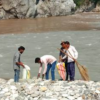Due to sustainable utilization of coal mine water resources by Central Public Sector Enterprises (CPSEs) under the Ministry of Coal, an estimated 17.7 lakh people across 981 villages of nine states are benefited. During the fiscal 2022-23, CPSEs discharged approximately 8130 Lakh m3 of mine water, with 46% allocated for community uses such as domestic and irrigation purposes, 49% for internal domestic and industrial needs, and 6% reserved for groundwater recharge initiatives. To ensure suitability of mine water for drinking and irrigation purposes, various treatment methods have been implemented. Several measures have been undertaken to provide access to safe and clean water for communities throughout the year.
In the course of coal mining operations, a substantial volume of mine water accumulates in the mine sumps. These voids not only store seepage water from strata but also collect surface runoff water from the surrounding catchment areas, effectively functioning as extensive water harvesting and ground water recharge structures. This stored mine water serves a range of community purposes, including domestic and drinking water supply, irrigation of agricultural fields, groundwater replenishment, and various industrial applications like dust suppression and heavy machinery washing.
Reverse Osmosis (RO) Filter Plant at Ningah Colliery:
Located within the premises of Ningah Colliery of Eastern Coalfields Limited in Paschim Bardhaman District of West Bengal, a state-of-the-art reverse osmosis (RO) filter plant with a capacity of 5000 litres per hour has been established. This plant treats pumped-out mine water, providing safe drinking water and water for domestic use to nearby villages and colonies. The RO technology employed effectively removes contaminants and impurities from water by forcing it through a semipermeable membrane, allowing only pure water molecules to pass through while blocking larger particles, ions and impurities. This approach ensures the production of high-quality purified water, meeting various community needs.
Water Supply Initiatives by SECL in Shahdol and Anuppur Districts, Madhya Pradesh:
In Shahdol and Anuppur districts of Madhya Pradesh, underground seepage water from Damini, Khairaha, Rajendra, and Navgaon underground mines is channeled into the Sarafa River. Prior to release, this water undergoes purification through step-by-step filtration processes at the Sarafa Dam. The treated water is then used for agricultural purposes in the areas surrounding the mines. Additionally, two filtration plants with a combined gross capacity of nine lakh litres have been established, benefiting over 5000 residents in the neighbouring villages of Khannath and Chirhiti.Source


